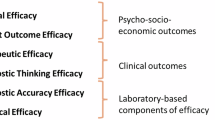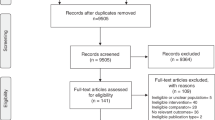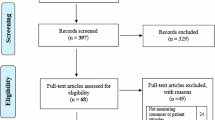Abstract
Researchers and clinicians refer to outcomes of genomic testing that extend beyond clinical utility as ‘personal utility’. No systematic delineation of personal utility exists, making it challenging to appreciate its scope. Identifying empirical elements of personal utility reported in the literature offers an inventory that can be subsequently ranked for its relative value by those who have undergone genomic testing. A systematic review was conducted of the peer-reviewed literature reporting non-health-related outcomes of genomic testing from 1 January 2003 to 5 August 2016. Inclusion criteria specified English language, date of publication, and presence of empirical evidence. Identified outcomes were iteratively coded into unique domains. The search returned 551 abstracts from which 31 studies met the inclusion criteria. Study populations and type of genomic testing varied. Coding resulted in 15 distinct elements of personal utility, organized into three domains related to personal outcomes: affective, cognitive, and behavioral; and one domain related to social outcomes. The domains of personal utility may inform pre-test counseling by helping patients anticipate potential value of test results beyond clinical utility. Identified elements may also inform investigations into the prevalence and importance of personal utility to future test users.
Similar content being viewed by others
Log in or create a free account to read this content
Gain free access to this article, as well as selected content from this journal and more on nature.com
or
References
Grosse SD, Khoury MJ : What is the clinical utility of genetic testing? Genet Med 2006; 8: 448–450.
Low CA, Bower JE, Kwan L, Seldon J : Benefit finding in response to BRCA1/2 testing. Ann Behav Med 2008; 35: 61–69.
Neumann PJ, Hammitt JK, Mueller C et al: Public attitudes about genetic testing for Alzheimer's disease. Health Aff 2001; 20: 252–264.
Ravitsky V, Wilfond BS : Disclosing individual genetic results to research participants. Am J Bioeth 2006; 6: 8–17.
Wasson K, Sanders TN, Hogan NS, Cherny S, Helzlsouer KJ : Primary care patients' views and decisions about, experience of and reactions to direct-to-consumer genetic testing: a longitudinal study. J Community Genet 2013; 4: 495–505.
Botkin JR, Teutsch SM, Kaye CI et al: Outcomes of interest in evidence-based evaluations of genetic tests. Genet Med 2010; 12: 228–235.
Bunnik EM, Schermer MH, Janssens AC : Personal genome testing: test characteristics to clarify the discourse on ethical, legal and societal issues. BMC Med Ethics 2011; 12: 11.
Finch AP, Lubinski J, Møller P et al: Impact of oophorectomy on cancer incidence and mortality in women with a BRCA1 or BRCA2 mutation. J Clin Oncol 2014; 32: 1547–1553.
Grosse SD, Wordsworth S, Payne K : Economic methods for valuing the outcomes of genetic testing: beyond cost-effectiveness analysis. Genet Med 2008; 10: 648–654.
Rogowski WH, Grosse SD, John J et al: Points to consider in assessing and appraising predictive genetic tests. J Community Genet 2010; 1: 185–194.
Berkenstadt M, Shiloh S, Barkai G, Katznelson MB-M, Goldman B : Perceived personal control (PPC): a new concept. Am J Med Genet 1999; 82: 53–59.
Bakos AD, Hutson SP, Loud JT, Peters JA, Giusti RM, Greene MH : BRCA mutation-negative women from hereditary breast and ovarian cancer families: a qualitative study of the BRCA-negative experience. Health Expect 2008; 11: 220–231.
Bernhardt BA, Zayac C, Pyeritz RE : Why is genetic screening for autosomal dominant disorders underused in families? The case of hereditary hemorrhagic telangiectasia. Genet Med 2011; 13: 812–820.
Bollinger JM, Scott J, Dvoskin R, Kaufman D : Public preferences regarding the return of individual genetic research results: findings from a qualitative focus group study. Genet Med 2012; 14: 451–457.
Shostak S, Zarhin D, Ottman R : What’s at stake? Genetic information from the perspective of people with epilepsy and their family members. Soc Sci Med 2011; 73: 645–654.
Burke W, Atkins D, Gwinn M et al: Genetic test evaluation: information needs of clinicians, policy makers, and the public. Am J Epidemiol 2002; 156: 311–318.
Veenstra DL, Roth JA, Garrison LP, Ramsey SD, Burke W : A formal risk-benefit framework for genomic tests: facilitating the appropriate translation of genomics into clinical practice. Genet Med 2010; 12: 686–693.
Haddow JE, Palomaki GE ACCE: a model process for evaluating data on emerging genetic tests; Human Genome Epidemiology: A Scientific Foundation for Using Genetic Information to Improve Health and Prevent Disease. USA: Oxford University Press: New York, NY, USA, 2004, pp 217–233..
Athens BA, Caldwell SL, Umstead KL, Connors PD, Brenna E, Biesecker BB : A systematic review of randomized controlled trials to assess outcomes of genetic counseling. Journal of Genetic Counseling 2017, [in press].
Cribb A, Owens J : Whatever suits you: unpicking personalization for the NHS. J Eval Clin Pract 2010; 16: 310–314.
Feero WG, Wicklund C, Veenstra DL : The economics of genomic medicine: insights from the IOM roundtable on translating genomic-based research for health. JAMA 2013; 309: 1235–1236.
Paul J, Metcalfe S, Stirling L, Wilson B, Hodgson J : Analyzing communication in genetic consultations—A systematic review. Patient Educ Couns 2015; 98: 15–33.
Kmet LM, Lee RC, Cook LS Standard Quality Assessment Criteria for Evaluating Primary Research Papers from a Variety of Fields. Edmonton: Alberta Heritage Foundation for Medical Research, 2004..
Dixon-Woods M, Agarwal S, Jones D, Young B, Sutton A : Synthesising qualitative and quantitative evidence: a review of possible methods. J Health Serv Res Policy 2005; 10: 45–53B.
Cornelis C, Tibben A, Dondorp W et al: Whole-exome sequencing in pediatrics: parents’ considerations toward return of unsolicited findings for their child. Eur J Hum Genet 2016; 24: 1681–1687.
Daack-Hirsch S, Driessnack M, Hanish A et al: 'Information is information': a public perspective on incidental findings in clinical and research genome-based testing. Clin Genet 2013; 84: 11–18.
Facio FM, Brooks S, Loewenstein J, Green S, Biesecker LG, Biesecker BB : Motivators for participation in a whole-genome sequencing study: implications for translational genomics research. Eur J Hum Genet 2011; 19: 1213–1217.
Facio F, Eidem H, Fisher T et al: Intentions to receive individual results from whole-genome sequencing among participants in the ClinSeq study. Eur J Hum Genet 2013; 21: 261–265.
Fox E, McCuaig J, Demsky R et al: The sooner the better: genetic testing following ovarian cancer diagnosis. Gynecol Oncol 2015; 137: 423–429.
Giordimaina AM, Sheldon JP, Petty EM : Anticipated motivation for genetic testing among smokers, nonsmokers, and former smokers: an exploratory qualitative study of decision making. Public Health Genomics 2014; 17: 228–239.
Goh AM, Chiu E, Yastrubetskaya O et al: Perception, experience, and response to genetic discrimination in Huntington's disease: the Australian results of The International RESPOND-HD study. Genet Test Mol Biomarkers 2013; 17: 115–121.
Gooding HC, Linnenbringer EL, Burack J, Roberts JS, Green RC, Biesecker BB : Genetic susceptibility testing for Alzheimer disease: motivation to obtain information and control as precursors to coping with increased risk. Patient Educ Couns 2006; 64: 259–267.
Hayeems RZ, Babul-Hirji R, Hoang N, Weksberg R, Shuman C : Parents' experience with pediatric microarray: transferrable lessons in the era of genomic counseling. J Genet Couns 2016; 25: 298–304.
Hoskins LM, Werner-Lin A : A multi-case report of the pathways to and through genetic testing and cancer risk management for BRCA mutation-positive women aged 18-25. J Genet Couns 2013; 22: 27–38.
Levenseller BL, Soucier DJ, Miller VA, Harris D, Conway L, Bernhardt BA : Stakeholders' opinions on the implementation of pediatric whole exome sequencing: implications for informed consent. J Genet Couns 2014; 23: 552–565.
Lewis KL, Hooker GW, Connors PD et al: Participant use and communication of findings from exome sequencing: a mixed-methods study. Genet Med 2016; 18: 577–583.
Meisel SF, Wardle J : 'Battling my biology': psychological effects of genetic testing for risk of weight gain. J Genet Couns 2014; 23: 179–186.
Reiff M, Giarelli E, Bernhardt BA et al: Parents' perceptions of the usefulness of chromosomal microarray analysis for children with autism spectrum disorders. J Autism Dev Disord 2015; 45: 3262–3275.
Steinberg AG, Kaimal G, Bain L, Krantz I, Li Y : Parental narratives on genetic testing for children with hearing loss: a qualitative inquiry. Am J Med Genet A 2007; 143: 1533–1545.
Van Der Zwaag AM, Weinreich SS, Bosma AR et al: Current and best practices of genetic testing for maturity onset diabetes of the young: views of professional experts. Public Health Genomics 2015; 18: 52–59.
Vayena E, Gourna E, Streuli J, Hafen E, Prainsack B : Experiences of early users of direct-to-consumer genomics in Switzerland: an exploratory study. Public Health Genomics 2012; 15: 352–362.
Williams JK, Erwin C, Juhl A, Mills J, Brossman B, Paulsen JS : Personal factors associated with reported benefits of Huntington disease family history or genetic testing. Genet Test Mol Biomarkers 2010; 14: 629–636.
Wright MF, Lewis KL, Fisher TC et al: Preferences for results delivery from exome sequencing/genome sequencing: genome results preferences. Genet Med 2014; 16: 442.
Yu JH, Crouch J, Jamal SM, Bamshad MJ, Tabor HK : Attitudes of non-African American focus group participants toward return of results from exome and whole genome sequencing. Am J Med Genet A 2014; 164a: 2153–2160.
Yu JH, Crouch J, Jamal SM, Tabor HK, Bamshad MJ : Attitudes of African Americans toward return of results from exome and whole genome sequencing. Am J Med Genet A 2013; 161a: 1064–1072.
Zarate OA, Brody JG, Brown P, Ramirez-Andreotta MD, Perovich L, Matz J : Balancing benefits and risks of immortal data: participants' views of open consent in the personal genome project. Hastings Cent Rep 2016; 46: 36–45.
Bernhardt BA, Zayac C, Pyeritz RE : Why is genetic screening for hereditary hemorrhagic telangiectasia underutilized in families? Hematol Rep 2011; 3: 37.
Birmingham WC, Agarwal N, Kohlmann W et al: Patient and provider attitudes toward genomic testing for prostate cancer susceptibility: a mixed method study. BMC Health Serv Res 2013; 13: 279.
Henneman L, Timmermans DR, Van Der Wal G : Public attitudes toward genetic testing: perceived benefits and objections. Genet Test 2006; 10: 139–145.
Neumann PJ, Cohen JT, Hammitt JK et al: Willingness-to-pay for predictive tests with no immediate treatment implications: a survey of US residents. Health Econ 2012; 21: 238–251.
Roberts SJ, LaRusse SA, Katzen H et al: Reasons for seeking genetic susceptibility testing among first‐degree relatives of people with Alzheimer disease. Alzheimer Dis Assoc Disord 2003; 17: 86–93.
Lupo PJ, Robinson JO, Diamond PM et al: Patients' perceived utility of whole-genome sequencing for their healthcare: findings from the MedSeq project. Per Med 2016; 13: 13–20.
Bunnik EM, Janssens AC, Schermer MH : Personal utility in genomic testing: is there such a thing? J Med Ethics 2015; 41: 322–326.
Bale SJ, Mitchell AG : Genetic testing in ectodermal dysplasia: availability, clinical utility, and the nuts and bolts of ordering a genetic test. Am J Med Genet A 2009; 149: 2052–2056.
Biesecker BB, Erby LH, Woolford S et al: Development and validation of the psychological adaptation scale (PAS): use in six studies of adaptation to a health condition or risk. Patient Educ Couns 2013; 93: 248–254.
Payne K, Nicholls S, McAllister M, MacLeod R, Donnai D, Davies LM : Outcome measurement in clinical genetics services: a systematic review of validated measures. Value Health 2008; 11: 497–508.
McAllister M, Dearing A : Patient reported outcomes and patient empowerment in clinical genetics services. Clin Genet 2015; 88: 114–121.
Eijzenga W, Bleiker EM, Hahn DE et al: Psychosocial aspects of hereditary cancer (PAHC) questionnaire: development and testing of a screening questionnaire for use in clinical cancer genetics. Psychooncology 2014; 23: 862–869.
McAllister M, Wood AM, Dunn G, Shiloh S, Todd C : The Genetic Counseling Outcome Scale: a new patient-reported outcome measure for clinical genetics services. Clin Genet 2011; 79: 413–424.
Barr PJ, Scholl I, Bravo P, Faber MJ, Elwyn G, McAllister M : Assessment of patient empowerment-a systematic review of measures. PLoS ONE 2015; 10: e0126553.
Turbitt E, Halliday J, Amor D, Metcalfe S : Preferences for results from genomic microarrays: comparing parents and health care providers. Clin Genet 2015; 87: 21–29.
Acknowledgements
We would like to thank Judith Welsh and Verma Walker, NIH Librarians for developing the database search strategies and performing the literature searches in support of this systematic review. The Intramural Research Program of the National Human Genome Research Institute, National Institutes of Health funded this study.
Author information
Authors and Affiliations
Corresponding author
Ethics declarations
Competing interests
The authors declare no conflict of interest.
Additional information
Supplementary Information accompanies this paper on European Journal of Human Genetics website
Supplementary information
Rights and permissions
About this article
Cite this article
Kohler, J., Turbitt, E. & Biesecker, B. Personal utility in genomic testing: a systematic literature review. Eur J Hum Genet 25, 662–668 (2017). https://doi.org/10.1038/ejhg.2017.10
Received:
Revised:
Accepted:
Published:
Issue date:
DOI: https://doi.org/10.1038/ejhg.2017.10
This article is cited by
-
Are we properly evaluating genetic and genomic testing? A systematic review of health technology assessment reports
Journal of Translational Medicine (2025)
-
Older research participants are motivated to receive genetic results for the benefit of younger relatives
European Journal of Human Genetics (2025)
-
Determining the value of genomics in healthcare
Nature Medicine (2025)
-
Assessing the prevalence of unmet need for genetic counseling in Canada and exploring associations with sociodemographic factors
European Journal of Human Genetics (2025)
-
A roadmap for genome projects to foster psychosocial and economic evidence to further policy and practice
Communications Medicine (2025)



